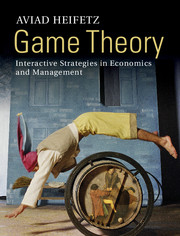Crossref Citations
This Book has been
cited by the following publications. This list is generated based on data provided by Crossref.
Marini, François
2013.
Bankruptcy Litigation and Relationship Banking.
Journal of Business Finance & Accounting,
Vol. 40,
Issue. 1-2,
p.
272.
Huric Larsen, Jesper Fredborg
2014.
Strategies and Evaluating Strategic Choices of Firms and Consumers.
SSRN Electronic Journal,
Hsieh, H. Pierre
2015.
The Translator As the Economist: An Economic Turn for Translation Studies?.
SSRN Electronic Journal,
Ghosh, Sujata
Heifetz, Aviad
and
Verbrugge, Rineke
2016.
Do players reason by forward induction in dynamic perfect information games?.
Electronic Proceedings in Theoretical Computer Science,
Vol. 215,
Issue. ,
p.
159.
de Bruin, Boudewijn
and
Walter, Christian
2017.
Methods and Finance.
Vol. 34,
Issue. ,
p.
73.
Li, Shuangbo
Zheng, Xiaokun
Zhang, Tao
and
Zhang, Yan
2017.
Power Trading Mode in Multi-Microgrids with Controllable Distributed Generation: A Game-Theoretic Approach.
p.
165.
Rajtarski, Krzysztof
2020.
Political problems connected with the efficient realization of the nature conservation policy in the global economy.
Optimum. Economic Studies,
p.
163.
Alferev, D. A.
and
Kremin, A. E.
2020.
MULTI-PURPOSE OPTIMIZATION OF THE PRODUCT RELEASE PROGRAM.
Vestnik Universiteta,
Vol. 1,
Issue. 12,
p.
92.
Ibrahim, Imad Antoine
2020.
Legal Implications of the Use of Big Data in the Transboundary Water Context.
Water Resources Management,
Vol. 34,
Issue. 3,
p.
1139.
Li, Ming
Zhang, Fan
Gao, Hongjun
Qing, Zhuyu
Yang, Jingxi
and
Zhong, Lei
2020.
Hierarchical Game Trading Model for Multiple VPPs Considering the Interaction with Distribution System.
p.
368.
Crettez, Bertrand
Deloche, Régis
and
Jeanneret‐Crettez, Marie‐Hélène
2020.
A demand‐induced overtreatment model with heterogeneous experts.
Journal of Public Economic Theory,
Vol. 22,
Issue. 5,
p.
1713.
Raub, Werner
2022.
Conceptualizing ‘Cooperation’ and ‘Defection’ in the Volunteer’s Dilemma (and in Social Dilemmas More Generally)*.
Homo Oeconomicus,
Baczyk, Michal
and
Fourny, Ghislain
2023.
Nashian game theory is incompatible with quantum physics.
Quantum Studies: Mathematics and Foundations,
Puthusseri, Sahal Ali Ahmed
2023.
A self-enforced optimal framework for inter-platoon transfer in connected vehicles.
Journal of Intelligent Transportation Systems,
Vol. 27,
Issue. 4,
p.
536.
Apt, Krzysztof R.
and
Simon, Sunil
2023.
Iterated Elimination of Weakly Dominated Strategies in Well-Founded Games.
Electronic Proceedings in Theoretical Computer Science,
Vol. 379,
Issue. ,
p.
16.





